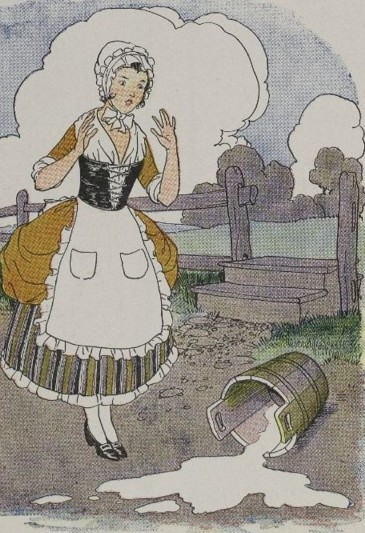| 1. milkmaid | /MILK-meyd/ |
| -a woman who milks cows or is employed in a dairy | |
| The milkmaid forgot to bring the bucket. | |
| 2. churn | /CHURN/ |
| -to move something, especially a liquid, with great force | |
| Mary is having a hard time churning the batter. | |
| 3. scornfully | /SKAWRN-fuh-lee/ |
| -in a way that shows you have no respect for someone or something | |
| Cody looked at him scornfully. | |
| 4. toss | /TAWS/ |
| -to throw something carelessly | |
| She accidentally tossed the ball before the referee’s signal. | |
| 5. vanish | /VAN-ish/ |
| -to disappear or stop being present or existing, especially in a sudden, surprising way | |
| The thief vanished right after grabbing my bag. |

A Milkmaid had been out to milk the cows and was returning from the field with the shining milk pail balanced nicely on her head. As she walked along, her pretty head was busy with plans for the days to come.
“This good, rich milk”, she mused, “will give me plenty of cream to churn. The butter I make I will take to market, and with the money I get for it I will buy a lot of eggs for hatching. How nice it will be when they are all hatched and the yard is full of fine young chicks. Then when May day comes I will sell them, and with the money I’ll buy a lovely new dress to wear to the fair. All the young men will look at me. They will come and try to make love to me,—but I shall very quickly send them about their business!”
As she thought of how she would settle that matter, she tossed her head scornfully, and down fell the pail of milk to the ground. And all the milk flowed out, and with it vanished butter and eggs and chicks and new dress and all the milkmaid’s pride.
Do not count your chickens before they are hatched.
| 1. | What was the Milkmaid doing as she was walking along? |
| 2. | What would the Milkmaid buy with the money she would get from selling the butter? |
| 3. | What was the Milkmaid thinking about doing with the chickens that would be hatched? |
| 1. | How do you think the Milkmaid was feeling after the milk spilled? |
| 2. | Are you an impulsive buyer? Please tell me more about it. |
| 3. | Which part of the fable struck you the most? Why? |
| 4. | Do you agree with the fable’s lesson? Why or why not? |
| 5. | Cite and explain another situation similar to the fable’s lesson. |
| Grammar 文法 |
Pronunciation 発音 | Vocabulary 単語 |
Comprehension 理解 |
|
|---|---|---|---|---|
 GOOD GOOD |
文法の誤りはほとんどなく、完全な文章で話すことができる | ほとんどの単語をはっきりと正しく発音することができる | 習った表現を適切に使うことができる | 文章を理解し、質問に正しく答えることができる |
 FAIR |
文法の誤りはあるが、完全な文章で話すことができる | 発音の練習が必要な言葉がいくつかある | たまにミスはあるが、習った表現を適切に使うことができる | 文章を完全に理解するのは難しく、質問に正しく答えられないときもある |
 POOR |
文章で話すのは難しく、単語だけで話すことができる | 発音の練習が必要である | 習った単語と表現を少しだけ使うことができる | 文章を理解するのは難しく、質問に答えるのは難しい |
An eBook from The Project Gutenberg.
This eBook is for the use of anyone anywhere at no cost and with almost no restrictions whatsoever. You may copy it, give it away or re-use it under the terms of the Project Gutenberg License included with this eBook or online at www.gutenberg.org